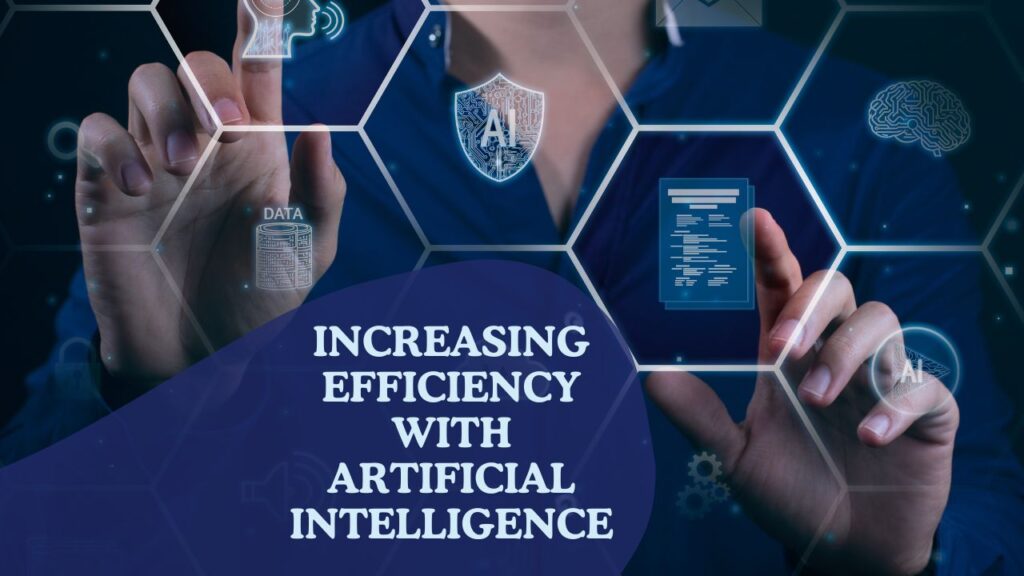
In today’s fast-paced world, efficiency is critical for businesses and organizations that want to remain competitive. Whether it’s streamlining operations, optimizing resources, or increasing productivity, finding methods to improve efficiency is an ongoing quest. Artificial intelligence (AI) is one of the most disruptive technologies, generating efficiency benefits across a variety of industries.
Table of Contents
Understanding Artificial Intelligence (AI)
Artificial intelligence is the imitation of human intelligence processes by computers, specifically computer systems. These processes include learning, thinking, problem solving, perception, and language comprehension. AI technologies strive to replicate cognitive functions, allowing machines to accomplish activities that would normally need human intelligence.
Applications of AI in Enhancing Efficiency
Automation of Repetitive Tasks
AI excels in automating repetitive and mundane work, freeing up human resources to pursue more strategic and creative endeavors. From data entry and document processing to customer service encounters, AI-powered automation solutions can handle mundane tasks quickly and accurately.
Predictive Analytics
Predictive analytics uses artificial intelligence algorithms to examine past data, find patterns, and generate accurate forecasts about future outcomes. Organizations can reduce downtime and increase efficiency by estimating demand, optimizing inventory levels, and anticipating maintenance needs.
Resource Allocation Optimization
AI algorithms can optimize resource allocation by dynamically altering schedules, routes, and workflows in response to real-time data and changing conditions. AI-driven optimization algorithms can enhance efficiency and reduce waste in a variety of applications, including transportation logistics, labor scheduling, and energy consumption.
Case Studies Demonstrating AI’s Impact on Efficiency
Healthcare Sector
In the healthcare industry, artificial intelligence is transforming patient care, diagnosis, and treatment. AI-powered solutions improve efficiency by streamlining processes and improving clinical decision-making in areas ranging from medical imaging analysis and predictive analytics for disease management to personalized treatment suggestions.
Manufacturing Industry
AI-driven automation is revolutionizing manufacturing processes, ranging from assembly line operations to quality control. Robots equipped with AI vision systems can do difficult jobs with pinpoint accuracy, while predictive maintenance algorithms can anticipate equipment faults, minimizing downtime and increasing overall productivity.
Challenges and Limitations of Implementing AI for Efficiency
Despite its potential benefits, implementing AI for efficiency enhancement comes with its share of challenges and limitations.
Data Privacy Concerns
AI systems rely on massive volumes of data to learn and make judgments, creating questions about data privacy and security. To protect sensitive information, organizations must maintain regulatory compliance and deploy strong data security procedures.
Initial Investment Costs
The initial expenditure necessary to create and deploy AI solutions can be significant, creating a barrier to entry for some businesses. However, the long-term rewards in terms of efficiency gains and cost savings frequently make the investment worthwhile.
Overcoming Challenges and Maximizing AI Efficiency
To overcome challenges and maximize the efficiency of AI implementations, organizations can take proactive measures such as:
Data Security Measures
Implementing robust data encryption, access controls, and monitoring systems to protect sensitive information and maintain data integrity.
Collaborative Partnerships
Collaborating with AI technology providers, industry experts, and regulatory bodies to navigate challenges, share best practices, and drive innovation in AI-driven efficiency enhancement.
Future Outlook: AI’s Role in Continuously Improving Efficiency
As AI technologies expand and mature, their importance in improving efficiency across industries will only increase. AI has the ability to alter the way businesses operate and provide value, from streamlining supply chains and logistics to redefining customer service and personalized experiences.
Conclusion
In conclusion, artificial intelligence is a great tool for increasing efficiency in today’s continuously changing corporate world. Organizations may streamline processes, cut costs, and provide more value to customers by leveraging AI’s capabilities in automation, predictive analytics, and resource management. Despite worries about data protection and initial investment costs, the benefits of AI-driven efficiency improvement far outweigh the dangers. Organizations can realize the full potential of AI to promote continuous development and stay ahead of the competition by taking proactive actions and forming strategic collaborations.